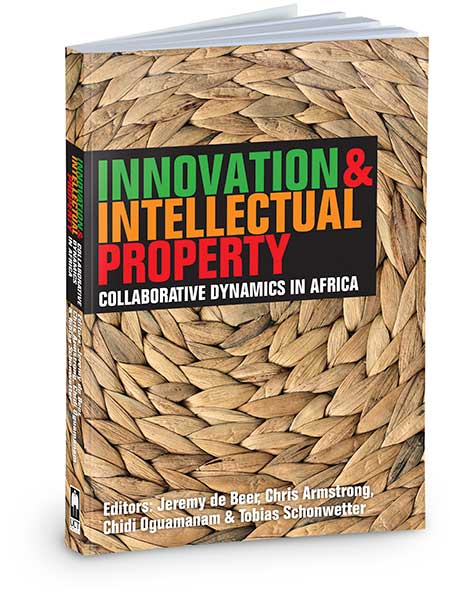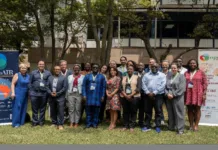Editors: Jeremy de Beer, Chris Armstrong, Chidi Oguamanam and Tobias Schonwetter
Publication Date: 2014
Download: Innovation and Intellectual Property: Collaborative Dynamics in Africa (PDF, EPUB)
Innovation and Intellectual Property: Collaborative Dynamics in Africa is an edited volume of real-world case studies examining innovators in nine countries – Egypt, Nigeria, Ghana, Ethiopia, Uganda, Kenya, Mozambique, Botswana and South Africa – across many sites of innovation and creativity including music, leather goods, textiles, cocoa, coffee, auto parts, traditional medicine, book publishing, biofuels and university research.
Various forms of intellectual property protection are explored: copyrights, patents, trademarks, geographical indications and trade secrets, as well as traditional and informal mechanisms of knowledge governance.
In the global knowledge economy, intellectual property (IP) rights – and the innovations they are meant to spur – are important determinants of progress. But what does this mean for the nations of Africa? One view is that strong IP protection can facilitate innovation in African settings. Others say that existing IP systems are simply not suited to the realities of African innovators.
This book, based on case studies and evidence collected through research across nine countries in Africa, sheds new light on the complex relationships between innovation and intellectual property. It covers findings from Egypt, Nigeria, Ghana, Ethiopia, Uganda, Kenya, Mozambique, Botswana and South Africa, across many sites of innovation and creativity including music, leather goods, textiles, cocoa, coffee, auto parts, traditional medicine, book publishing, biofuels and university research. Various forms of intellectual property protection are explored: copyrights, patents, trademarks, geographical indications and trade secrets, as well as traditional and informal mechanisms of knowledge governance.
The picture emerging from the empirical research presented in this volume is one in which innovators in diverse African settings share a common appreciation for collaboration and openness. And thus, when African innovators seek to collaborate, they are likely to be best-served by IP approaches that balance protection of creative, innovative ideas with information-sharing and open access to knowledge.
The authors, who come from a range of disciplines, are all experts in their fields, working together through the Open African Innovation Research (Open AIR) network.
Themes
The studies in this book touch on:
- innovation, entrepreneurship and knowledge management in the informal economy
- bi-directional innovation transfers between informal and formal sectors
- use of geographical indication (GI) trademarks or sui generis GI systems to brand products according to their places of origin
- use of communal quality certification trademarks
- indigenous and local community use of “commons” arrangements to pool, document and manage access to innovations based on traditional knowledge
- distribution and marketing of copyrighted creative works via online open licensing and “freemium” models
- African national patent offices’ capacity to examine and publicise patent filings
- patenting and innovation in the biofuel technology sector
- management of the benefits of publicly funded research
- priorities for African policymakers seeking to support African collaborative innovation
Editors
Prof. Jeremy de Beer is a Professor in the Faculty of Law, University of Ottawa.
Dr. Chris Armstrong is a Visiting Researcher at the LINK Centre, University of the Witwatersrand, Johannesburg.
Dr. Chidi Oguamanam is an Associate Professor in the Faculty of Law, University of Ottawa, and a lawyer with Blackfriars LLP in Lagos.
Dr. Tobias Schonwetter is Director of the IP Unit in the Faculty of Law, University of Cape Town, and African Regional Coordinator for Creative Commons.
Table of Contents
- Innovation, Intellectual Property and Development Narratives in Africa – Jeremy de Beer, Chidi Oguamanam and Tobias Schonwetter
- Frameworks for Analysing African Innovation: Entrepreneurship, the Informal Economy and Intellectual Property – Jeremy de Beer, Izabella Sowa and Kristen Holman
- Informal-Formal Sector Interactions in Automotive Engineering, Kampala – Dick Kawooya
- Geographical Indication (GI) Options for Ethiopian Coffee and Ghanaian Cocoa – Chidi Oguamanam and Teshager Dagne
- A Consideration of Communal Trademarks for Nigerian Leather and Textile Products – Adebambo Adewopo, Helen Chuma-Okoro and Adejoke Oyewunmi
- The Policy Context for a Commons-Based Approach to Traditional Knowledge in Kenya – Marisella Ouma
- Consideration of a Legal “Trust” Model for the Kukula Healers’ TK Commons in South Africa – Gino Cocchiaro, Johan Lorenzen, Bernard Maister and Britta Rutert
- From De Facto Commons to Digital Commons? The Case of Egypt’s Independent Music Industry – Nagla Rizk
- Reflections on Open Scholarship Modalities and the Copyright Environment in Kenya – Ben Sihanya
- African Patent Offices Not Fit for Purpose – Ikechi Mgbeoji
- The State of Biofuel Innovation in Mozambique – Fernando dos Santos and Simão Pelembe
- Reflections on the Lack of Biofuel Innovation in Egypt – Bassem Awad and Perihan Abou Zeid
- Effects of the South African IP Regime on Generating Value from Publicly Funded Research: An Exploratory Study of Two Universities – Caroline Ncube, Lucienne Abrahams and Titi Akinsanmi
- Towards University-Industry Innovation Linkages in Ethiopia – Wondwossen Belete
- Perspectives on Intellectual Property from Botswana’s Publicly Funded Researchers – Njoku Ola Ama
- Current Realities of Collaborative Intellectual Property in Africa – Jeremy de Beer, Chris Armstrong, Chidi Oguamanam and Tobias Schonwetter
Downloads
Download Entire Book as PDF (678kb).
Ch. 3 – Kawooya – Informal-Formal Sector Interactions in Automoative Engineering, Kampala
Ch. 6 – Ouma – The Policy Context for a Commons-Based Approach to Traditional Knowledge in Kenya
Ch. 9 – Sihanya – Reflections on Open Scholarship Modalities & the Copyright Environment in Kenya
Ch. 10 – Mgbeoji – African Patent Offices Not Fit for Purpose
Ch. 11 – Dos Santos & Pelembe – The State of Biofuel Innovation in Mozambique
Ch. 12 – Awad & Abou Zeid – Reflections on the Lack of Biofuel Innovation in Egypt
Ch. 14 – Belete – Towards University-Industry Innovation Linkages in Ethiopia
Ch. 15 – Ama – Perspectives on Intellectual Property from Botswana’s Publicly Funded Researchers










